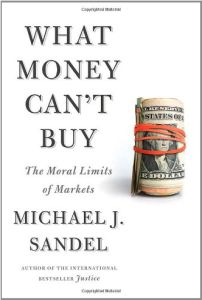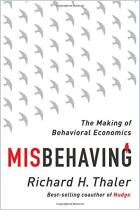Acesse a sua conta getAbstract para obter o resumo!

Acesse a sua conta getAbstract para obter o resumo!
Michael J. Sandel
What Money Can’t Buy
The Moral Limits of Markets
FSG, 2012
Sobre o que é?
A personalized look at the morality of markets – or, what would you charge to tattoo a logo on your face?
Recommendation
In this timely treatise, Harvard professor Michael J. Sandel intervenes in the cultural trend toward expanding the market’s role in society. In a balanced and humane tone – and with exceptionally smooth prose – he calls for a discussion of society’s most profound values. Sandel’s Harvard lectures are popular because he makes the complex accessible. That said, he unfortunately slides past some of the issues: More than once, he writes of ideas and activities that society judges as ethically dubious, without offering supporting evidence in the text. That objection aside, getAbstract recommends this moral investigation to a wide range of readers: It will be particularly useful to economists and to anyone concerned about doing the right thing.
Summary
About the Author
Michael Sandel, author of the bestseller, Justice: What’s the Right Thing to Do?, is the Anne T. and Robert M. Bass professor of government at Harvard University.























Comment on this summary
Der Typ kennt grundlegende Prinzipien nicht, appelliert mit dummen Pauschalisierungen an Emotionen, ohne darauf einzugehen, dass es bei den Alternativen viel schlechter kommt.
Vermutlich will er, dass seine Leser denken, "Ui nei, so schlimm. Wir müssen jemandem wie Sandel die Macht geben"
Beispiel "Jumping the queue": Er kennt wohl das grundlegenste Prinzip nicht: Knappheit. Dies wird natürlich nie verschwinden.
Er propagiert, dass Ineffizienzen bestehen bleiben, und Probleme der Bevölkerung nicht gelöst werden, es ist halt gut, in der Schlange zu stehen. Genauso schlecht sind die Folgen, wenn eine "Regierung" die Schlange managed. Zumeist Korruption, Bevorzugung von Gruppen, die der Regierung freundlich gesinnt sind, oder die Widerwahl gewährleisten. Oder bei einer Demokratie: viel langsamere Innovation.
Nur unternehmerische Innovation, angetrieben durch die Marktwirtschaft und die Belohnung von Lösung von Problemen, wird die Probleme am schnellsten und besten lösen.